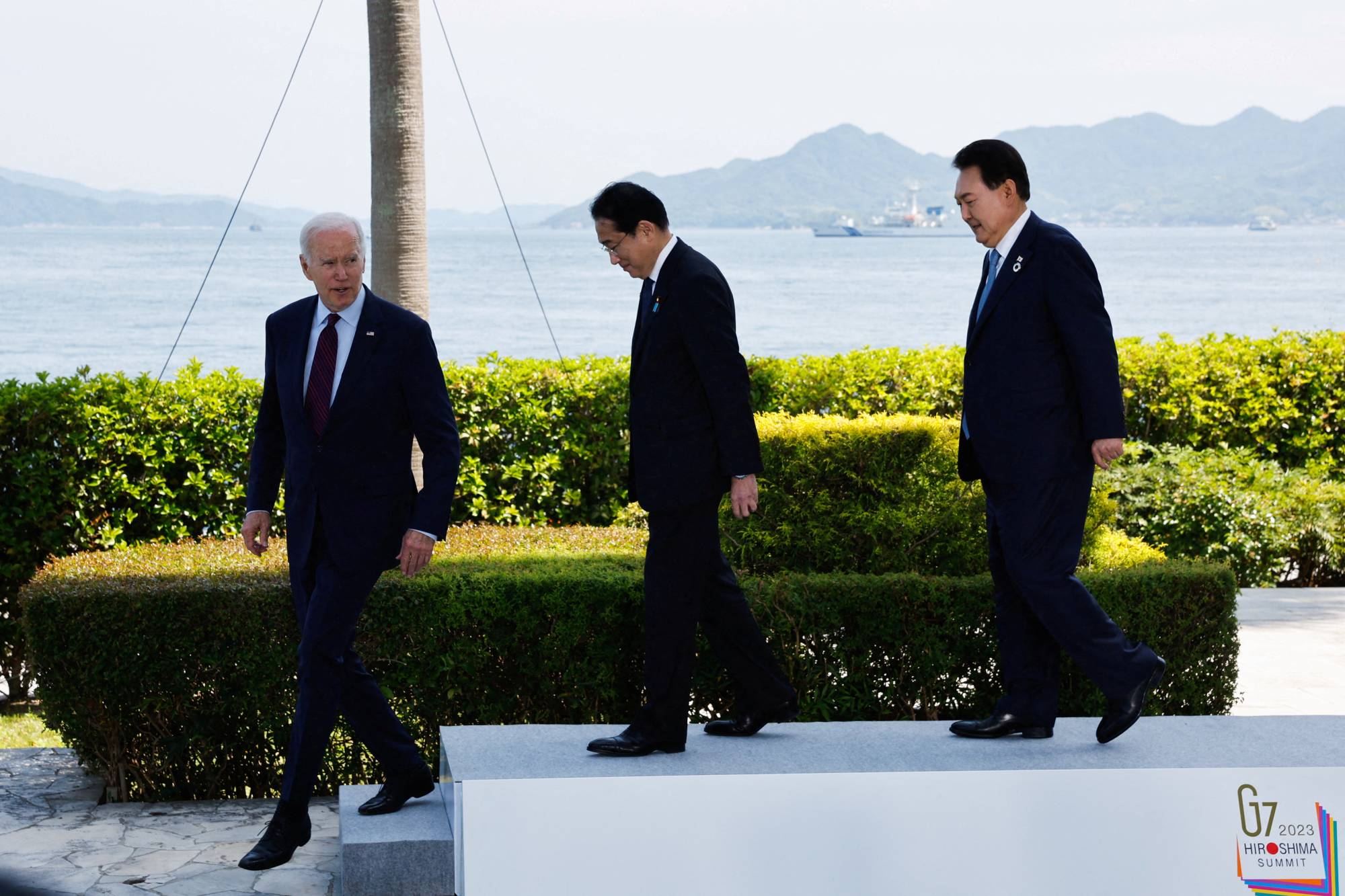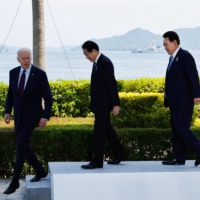U.S. President Joe Biden has invited Prime Minister Fumio Kishida and South Korean leader Yoon Suk-yeol to Washington for a summit this summer to discuss locking in progress made in improving trilateral ties, the White House’s top Asia official said Thursday.
"President Biden extended an invitation to both Prime Minister Kishida and President Yoon to come to Washington later this summer for a three-way summit between the leaders," White House Indo-Pacific Coordinator Kurt Campbell said in a pre-recorded video speech to a forum in Seoul.
The envisioned trilateral summit would be their first not to be held on the sidelines of a multilateral forum — giving the three leaders a chance to focus more intently on their shared goals. The summit could happen around the end of August, the Asahi Shimbun reported, citing multiple unidentified Japanese and South Korean officials.
Campbell made the remarks as the Tokyo-Seoul relationship continues to improve after it plunged to fresh depths in recent years due to disagreements over wartime labor and other issues. Kishida and Yoon signaled the direction of bolstered ties after the South Korean leader announced a solution to the long-festering row over wartime labor. That move opened the spigot for a steady flow of high-level engagements, including the resumption of “shuttle diplomacy,” which saw the two leaders visit their countries’ respective capitals earlier this year.
The two leaders and Biden are expected to use the visit to Washington to further cement bilateral and trilateral cooperation, as North Korea continues to refine its nuclear and missile capabilities — and as concerns over Chinese military assertiveness grow in all three capitals. Russia’s bloody war in Ukraine will also likely be high on the agenda.
"(At the trilateral summit), we will celebrate the remarkable progress that's been made in the bilateral relationship between Japan and South Korea, and to see what steps we can take to make sure we lock that progress in and to see what's possible to trilateralize areas of cooperation going forward," Campbell said.
Biden initially invited Kishida and Yoon to Washington on the sidelines of last month’s Group of Seven summit in Hiroshima but did not mention the timing. Both Yoon and Kishida have held bilateral summits with Biden in Washington, with the South Korean leader visiting in April to mark the 70th anniversary of the U.S.-South Korea alliance.
At that April meeting, Yoon and Biden agreed to the so-called Washington Declaration, which calls for the establishment of a nuclear consultative group to discuss nuclear and strategic planning, a move intended to provide South Korea with greater insight into, and presumably also a greater voice in, U.S. plans for potential nuclear retaliation in the event of a North Korean attack.
North Korea has conducted tests of powerful new missiles and other weapons at an unprecedented pace, effectively pushing South Korea and Japan closer on security cooperation with the U.S., including via an agreement this month on a new mechanism to share real-time data on Pyongyang’s missile launches.
As for Japan’s potential participation in the Washington Declaration, Yoon said in May that such a move has “not been ruled out,” though the remarks were largely viewed as a gaffe by the South Korean president.
Asked Tuesday about the possible inclusion of Japan in the grouping, Pentagon spokesman Brig. Gen. Pat Ryder avoided answering the question, but said the U.S. values its bilateral ties with Tokyo and Seoul, adding that Washington will “certainly continue to work very closely with those allies to find opportunities for our nations to work together.”
One area where the three could more quickly cooperate would be on the challenge posed by Beijing.
South Korea has traditionally been wary of antagonizing China, its biggest trade partner, though Yoon has signaled more flexibility in his approach to the issue, especially after a recent diatribe by China’s ambassador slamming Seoul for making “wrong bets” in the Sino-U.S. rivalry.
Amid fears in Japan that the war in Ukraine “could be Asia tomorrow” — an oblique reference to a possible conflict over self-ruled Taiwan involving China and the U.S. — Kishida has overseen a dramatic shift in defense policy and a significant hike in spending.
Although Biden said last week that he had been responsible for persuading Kishida to almost double Japan’s defense budget by 2027, the U.S. leader appeared to backtrack on this claim Tuesday, saying: "He didn't need my convincing as much as he'd already decided."
Observers say these changes have been largely prompted by the increasingly held belief in Tokyo that China represents a grave threat to regional security — a view reflected in Japan’s new National Security Strategy, which called its powerhouse neighbor the “greatest strategic challenge ever.”




















With your current subscription plan you can comment on stories. However, before writing your first comment, please create a display name in the Profile section of your subscriber account page.